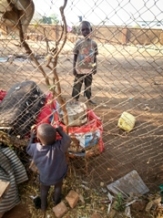Peace eludes Africa’s newest country as South Sudanese fight again for their lives
Outside the church where South Sudan’s president Salva Kiir prays every Sunday, Flora Joseph, 28, sleeps in the open. Paralyzed in both legs and unable to walk, she came here to seek refuge with her family when their village in Juba became the epicenter of South Sudan’s most recent conflict.

Although Flora is paralyzed, she’s also heavily pregnant with her first children, due later this month. With no clean water available, they’ve been drinking the contaminated water from the Nile – far from ideal when growing an unborn child.
“There is only one water pump here in the church but the water it produces is salty. We drink from the Nile knowing the water’s dirty, but what choice do we have?”
Having spent much of the last decade displaced and living in Khartourm, Flora’s story is one like countless others who have moved back to Juba following a peace deal in 2005 that lead to the independence of South Sudan. Returning with open hearts and minds and ready to rebuild the world’s newest country, they’re now harboring from shelling under makeshift shelters, separated from their families and fighting for their lives once more.
I myself am one of these people.
I was born in 1983 just a week before war erupted in Sudan. When my family fled the horror into neighboring Ethiopia, and then Kenya, and then Uganda I spent a difficult childhood growing up in refugee camps. When we eventually returned from exile to Bor, you could still smell the lingering stench of rotting human flesh. These were innocent civilians who had been killed, while the rest had died from disease and hunger because there was no way for aid agencies to reach them deep in the bush and villages. This, I thought, is what has become of my country.
Even as I write this my own children are experiencing life on the run. They are currently with their mother, having escaped across the border into Uganda, while I continue my role as Communication Manager with aid agency World Vision, responding to the crisis. My parents and siblings are hiding deep within the bush in South Sudan’s Jonglei state and living on limited food supplies. For now, they’re all safe. While there is nothing I can do to ease the deep worry for them in my heart, every moment of safety is a precious moment in South Sudan.
Since the fighting broke out on December 15 last year, more than 200,000 people have been displaced across South Sudan. Thousands have shifted across the border, seeking safety again in Ethiopia, Uganda and Kenya. Many more stream through every single day. Aid agencies like World Vision are desperately trying to reach those in need - to give them food and safe drinking water, shelter, and to care for their injuries. We are particularly concerned about the impact of violence on children, who become more vulnerable to abuse and are likely to be separated by their parents. The humanitarian need is so great and the security situation so tenuous, that action needs to take place now.
I hope and pray that the peace talks between the government and opposition forces in Addis Ababa help leaders settle their political differences and prevent this country from plunging into anarchy once more. To think of the innocent lives already lost on this hard soil to senseless conflict, we cannot think of seeing this country return back to war. With all of the optimism that we shared with the world in 2011 for South Sudan’s future, I hope that we can be harness that willful hope once more to protect the future of this country that we all so desperately fought for.
By Abraham Nhial, Communications Manager for World Vision South Sudan